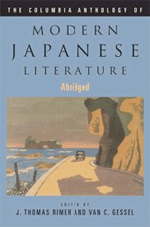J. Thomas Rimer and Van C. Gessel, eds.,
Columbia Anthology of Modern Japanese Literature, Abridged
(New York: Columbia University Press, 2011)
Note that a Kindle version is also available.

JAPAN 322: Survey of Fiction in Modern Japan
|
Professor Ted Mack This course surveys short fiction written in Japan during the modern period (roughly 1868-present). Reading a wide selection of short stories (and excerpts from novels), we will discuss the works as literary art, the historical context of the works' production, and relevant theoretical and literary discourses, some contemporary to the works and some from today. For practical reasons, we will be drawing our selections from a single anthology. Needless to say, this anthology necessarily excludes (as would any anthology) many important authors and works from modern Japan (not the least of which are Natsume Sôseki, considered by many the "father" of modern Japanese literature, and Ôe Kenzaburô, the 1994 recipient of the Nobel Prize for Literature.) For other recommendations, please see this reading list. |
Readings are drawn from the following anthology:
|
J. Thomas Rimer and Van C. Gessel, eds., Columbia Anthology of Modern Japanese Literature, Abridged Note that a Kindle version is also available. |
 |
DATE |
ASSIGNMENTS |
January 7 |
Introduction; Selection from Kyokutei Bakin, The Eight Dog Chronicles (1814-42) |
| 9 | Mori Ôgai, "The Dancing Girl" (1890; 8-23) |
11 |
Ozaki Kôyô, The Gold Demon (1897-1903; 128-35) |
14 |
Izumi Kyôka, "The Holy Man of Mount Kôya" (1900; 31-69) |
| 16 | Kunikida Doppo, "Meat and Potatoes" (1901; 70-84); Nagai Kafû, "The Mediterranean in Twilight" (1909; 123-27) |
18 |
Masamune Hakuchô, "The Clay Doll" (1911; 85-123) |
21 |
NO CLASS: Martin Luther King Day |
| 23 | Akutagawa Ryûnosuke, "The Nose" (1916; 176-80) and "The Christ of Nanking" (1920; 181-90); Tanizaki Jun'ichirô, "The Two Acolytes" (1918; 304-19) |
25 |
Kawabata Yasunari, "The Dancing Girl of Izu" (1926; 244-61); Edogawa Rampo, "The Human Chair" (1925; 190-200) |
28 |
Kuroshima Denji, "A Flock of Circling Crows" (1927; 273-90); Uchida Hyakken, "Realm of the Dead" (1922; 319-21) and "Triumphant march into Port Arthur" (1934; 321-23) |
| 30 | Ishikawa Tatsuzô, Soldiers Alive (1938; 380-88); Dazai Osamu, "December 8th" (1942; 373-79) |
| February 1 | Ôoka Shôhei, Taken Captive (1948; 388-418) |
4 |
Midterm Exam |
| 6 | Hirabayashi Taiko, "Demon Goddess" (1946; 514-20); Noma Hiroshi, "A Red Moon in Her Face" (1947; 616-35) |
8 |
Ibuse Masuji, "Old Ushitora" (1950; 527-41); Inoue Yasushi, "The Rhododendrons of Hira" (1950; 542-63) |
| 11 | Hayashi Fumiko, "Blindfold Phoenix" (1950; 504-13); Abe Kôbô, "The Red Cocoon" (1950; 449-51); Takeda Taijun, "The Misshapen Ones" (1950; 636-58) |
| 13 | Hotta Yoshie, "The Old Man" (1952; 521-26); Yasuoka Shôtarô, "Prized Possessions" (1952; 659-66); Kojima Nobuo, "The Smile" (1954; 566-78) |
15 |
Enchi Fumiko, "Skeletons of Men" (1956; 471-79); Ariyoshi Sawako, "The Village of Eguchi" (1958; 451-70) |
18 |
NO CLASS: Presidents' Day |
| 20 | Mishima Yukio, "Patriotism" (1960; 597-614) |
22 |
Kôno Taeko, "Final Moments" (1966; 578-97); Endô Shûsaku, "Mothers" (1969; 480-503) |
25 |
Kanai Mieko, "Homecoming" (1970; 563-66); Shima Tsuyoshi, "Bones" (1973; 813-23); Nakagami Kenji, "The Wind and the Light" (1975; 790-798) |
| 27 | Kaikô Takeshi, "The Crushed Pellet" (1978; 767-73); Takahashi Takako, "Invalid" (1978; 832-41); Hoshi Shin'ichi, "He-y, Come on Ou-t!" (1978; 764-66) |
March 1 |
Furui Yoshikichi, "Ravine" (1980; 742-56); Murakami Haruki, "Firefly" (1983; 774-90) |
4 |
Tawada Yôko, "Where Europe Begins" (1988; 841-54); Tsushima Yûko, "That One Glimmering Point of Light" (1988; 855-66) |
| 6 | Shimizu Yoshinori, "Jack and Better Forever" (1991; 824-32); Yoshimoto Banana, "Newlywed" (1991; 866-73) |
8 |
Hirano Keiichirô, "Clear Water" (2003; 756-63); Ogawa Yôko, "The Cafeteria in the Evening and a Pool in the Rain" (2004; 799-812) |
11 |
Second Exam |
|
If terms come up in the course of discussion that you are unfamiliar with, the following are excellent reference sites:
| Keywords for American Cultural Studies
(Off-campus link) "Keywords for American Cultural Studies provides an accessible A-to-Z survey of prevailing academic buzzwords, and a flexible tool for carving out new areas of inquiry." |
 |
|
Johns Hopkins Guide to Literary Theory and Criticism
(Off-campus link) |
 |
EXPECTATIONS and GRADING
PARTICIPATION: Participation in classroom discussions is central to successful performance in the class. Students must have read the relevant reading(s) before class and be prepared to discuss the stories. Although students will sometimes be called on, active participation in discussion is ultimately the student's responsibility.
GRADING: Grades will be determined through a combination of the student's preparation for and participation in discussions (40%), a midterm exam (30%), and an end-of-term exam (30%).
STUDY GROUPS: I encourage students to meet outside of class to discuss the stories and problems they have encountered in interpreting them.
CHEATING AND PLAGIARISM: The presentation of another's words and ideas as one's own is a serious offense; violations will be dealt with according to the University codes of conduct, which stipulate sanctions up to and including expulsion.
ACADEMIC ACCOMMODATIONS: I will do everything I can to accommodate students with particular needs. To request such an accommodation, please contact Disabled Student Services, 448 Schmitz, (206) 543-8924 (V/TTY). If you have a letter from Disabled Student Services indicating that you require such accommodation, we can discuss ways to meet those needs.
Page last updated on January 10, 2013